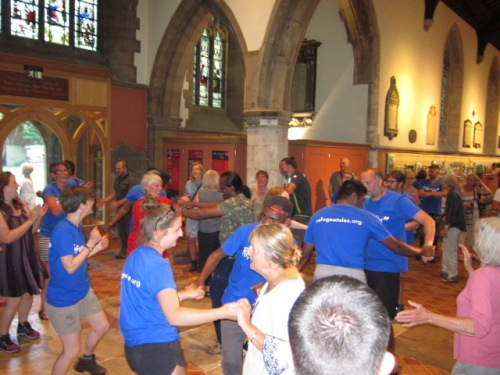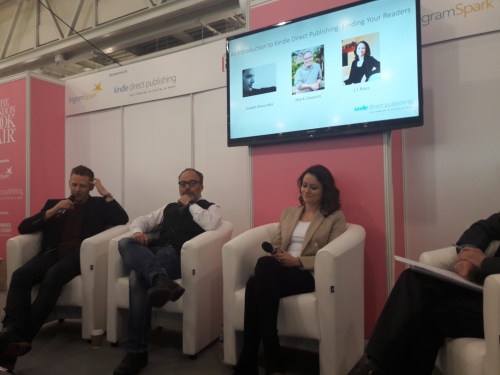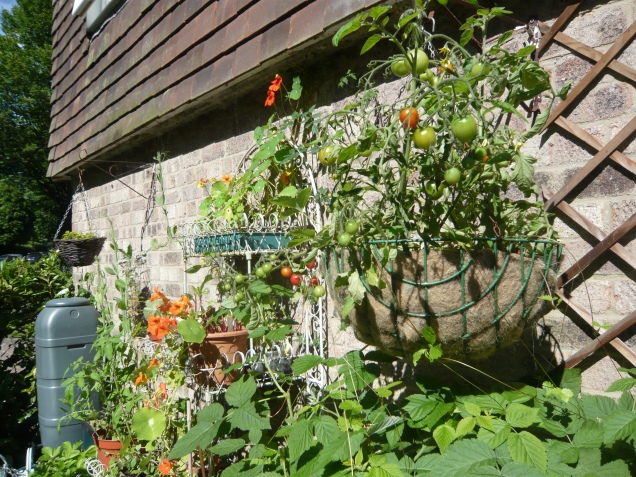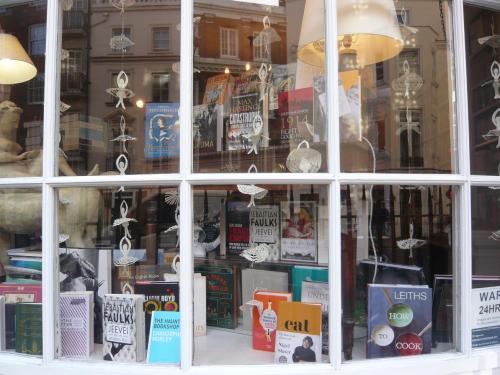
Rave in the nave, Kingston-on-Thames
I’m in a church in Kingston-on-Thames, dancing to the joyful sound of a steel band playing Bob Marley. The group I’m with laughs and claps, snaking in a conga-line around a politely-seated audience. I met these people only two days ago. How did I get here?
My story is simple: six months ago I saw a tweet about something called Refugee Tales. It sounded interesting; I went to the website and signed up. I more or less forgot about it until it was time to head for Runnymede (site of the signing of the Magna Carta) for the start of a winding walk along the Thames to Westminster.
For many of my fellow-walkers, this walk was part of a much longer journey, which started much further away, on other continents. Many of them had been through barely-imaginable hardships and dangers, and carried with them the grief of losing country, family, friends, the future they had planned. Their treatment on arrival in the UK was in some cases soul-destroying.
Except their souls had not been destroyed. Indeed, their souls were in fine shape, as witnessed by the laughter, singing and dancing all around me in that Kingston church.
Refugee Tales is a walk in solidarity with those held in indefinite detention by UK immigration services, while seeking refuge in this country.

Reflecting in a garden in Walton-on-Thames
It’s a profound and simple way of offering a welcome and perhaps forging a path through what has become hostile territory, creating our own welcome for those who have been denied that basic human dignity. Some of the walkers were detention visitors; some were people who had themselves been held in detention. Some were supporters of the cause, or people like me who’d simply heard about the event and liked the sound of it.
We walked together along the river Thames, getting to know each other, hearing each others’ stories, enjoying the tranquil surroundings, the freedom that comes from making our way unimpeded, on foot, to our destination. We ate together, and after the evening’s events, unrolled sleeping bags to fall asleep together in church halls offering hospitality.

Blue-shirted Refugee Walkers on the move
Patron of the charity, writer Ali Smith (one of my favourite authors) puts it beautifully, when she says: “The telling of stories is an act of profound hospitality.” She describes storytelling as an “ancient form of generosity” – and to emphasise the point, when she met us en-route, she read from the Odyssey, one of the oldest of old tales, describing how the lost and weary traveller was met with hospitality when shipwrecked on an island. There are many people shipwrecked on islands these days, including our own. The welcome is not always so generous.

Ali Smith reads from The Odyssey
One of the many things I learned on the walk was that the UK is the only country in Europe to hold those seeking refuge in indefinite, arbitrary detention. It’s a flagrant denial of their humanity, and one that directly contravenes the rights set out in the 13th century Magna Carta, let alone the Universal Declaration of Human Rights.
The Refugee Tales project is an offshoot of the Gatwick Detainees Welfare Group, a tireless and dogged charity that visits, supports and campaigns on behalf of people being held at in detention at Gatwick by the immigration service.
As well as organising the walk, Refugee Tales engages writers including Ali Smith, Jackie Kay, Helen Macdonald and Neel Mukherjee to work with detainees to write stories based on their experiences. The stories are collected in two volumes and are wonderful. They are even more electrifying when read aloud, by the writers or by actors, as they were during the evening events.

Dinner over, time to chat
In Kingston, I had a chat over dinner with a gentle and courteous young man whose story was being told that evening. Later I tried to imagine how he had survived the shocking experiences relayed in his tale, and remained so gentle. The previous night, an amazing young man told us his harrowing life story directly.
Both of these men wanted, above all, to finish their studies and be able to work – one as a social worker, the other as a doctor. The UK is lucky to have people of this calibre in our country. It’s about time we stopped treating them like criminals.
The first step in recognising someone as a human being is to listen to their story. The second, perhaps, is to share your own. Stories break down the barriers between ‘them’ and ‘us’. Before you know it, you’re all part of the same gang, on the same journey.
If anything can save the human world, I think it will be stories.
To find out more about how you can help, see the website http://refugeetales.org/getinvolved/



 I’ve had one thing drummed into me by publishing friends: book fairs are not for authors. They’re for publishers and agents, the ones with the cheque-books, to do the grown-up bit about contracts and deals, rights and publicity. Authors, with their dreams and stories, just get in the way.
I’ve had one thing drummed into me by publishing friends: book fairs are not for authors. They’re for publishers and agents, the ones with the cheque-books, to do the grown-up bit about contracts and deals, rights and publicity. Authors, with their dreams and stories, just get in the way.
 This midwinter, I’m reading Susan Cooper’s The Dark Is Rising, along with the peerless landscape author Robert Macfarlane and thousands of others on Twitter (#TheDarkIsReading if you want to join in).
This midwinter, I’m reading Susan Cooper’s The Dark Is Rising, along with the peerless landscape author Robert Macfarlane and thousands of others on Twitter (#TheDarkIsReading if you want to join in). Sydenham Hill woods was once part of the Great North Wood that covered this part of south London. It’s a domesticated suburban woodland now, but the backbone of the forest is still there; the soaring trunks of oak and hornbeam, straight and dark in the damp air, raising their bare canopies to the skies. Sombre holly hunches beneath (few scarlet berries this year), intertwined with glossy ivy.
Sydenham Hill woods was once part of the Great North Wood that covered this part of south London. It’s a domesticated suburban woodland now, but the backbone of the forest is still there; the soaring trunks of oak and hornbeam, straight and dark in the damp air, raising their bare canopies to the skies. Sombre holly hunches beneath (few scarlet berries this year), intertwined with glossy ivy.








